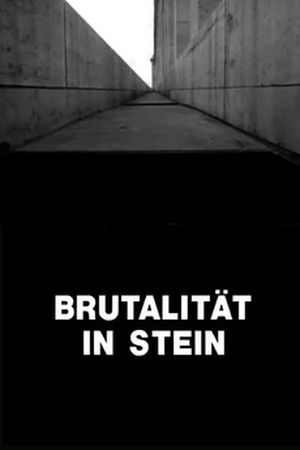Brutalität in Stein par SirBob
"Brutalität in Stein (Die Ewigkeit von gestern; Brutality in Stone; Yesterday Goes on for Ever) (1960)
In his experimental short film “Brutalitaet in Stein” (Brutality in Stone), Alexander Kluge features shots of huge neo-classical architectural structures from the Nazi period paired with a voice over of national-socialist propaganda fragments.
from UbuWebFilm, more of Kluge’s work can be found here.
Two quotes from Kluge, In “Die Utopie Film,” Kluge writes
“Film stands before a challenge, its material will always remain perceptions; montage allows us, however, to construct concepts. The smallest units of films, the parts called ‘shots,’ correspond to associations. In a film, the attempt by Joyce in Finnegan’s Wake or by Hans G. Helms to decompose words into their associative components and recompose them anew, would not fail because of problems of comprehension; it [film] is in any case assigned the task of producing at every moment new units of meaning by the editing together of perceptions …. Film has methods similar to polyphony of organizing material relationships. Not only can it set movements of speech and image in opposition, film can also produce in the tense spaces between speech and image still another movement in the spectator’s brain (not materialized in the film) which can furthermore stand in contrast to the film’s movements, and so forth.”
And in an interview with Enno Patalas and Frieda Grafe he says,
“Very crudely put: the cuts, which are not contained in the film, are as important as the image. Adorno once said – mockingly -that the only thing that bothered him were the images. He meant that that which is always concretely perceptible, as long as it leaves no gaps in which fantasy can take root, kills rather than encourages fantasy. Film must provide a space for fantasy, yet despite this, must also convey something through the images. In silent films the titles always excited me. Since, from a literary point of view, the titles are mostly idiotic, hardly informative or well-placed, I asked myself why I like to look at them. I am glad to see them because at that moment my brain begins to work and has a moment to evolve independent fantasies. Then I am glad to see pictures again.”
Alexander Kluge (b. 1932)
Writer, theorist, filmmaker, and television pioneer, Alexander Kluge is one of the intellectual giants of post-war Germany. Despite the scope of his achievements, his reputation in the United States rests largely on his contribution to the Oberhausen Manifesto, one of film history’s seminal documents. In 1962, at the Oberhausen Film Festival, a group of twenty-six filmmakers, including future luminaries Wim Wenders, Werner Herzog, and Rainer Werner Fassbinder, signed a well-publicized declaration that “the old film is dead, we believe in the new,” thereby kicking off the cinematic Golden Age now known as Das Neue Kino: “the New German Cinema.”
Kluge is often seen as the group’s intellectual father figure. Slightly older than the others, he had already trained as a lawyer and worked as an assistant to Fritz Lang. Perhaps more importantly, Kluge was the artist among them whose pursuit of the new most closely hewed to the revolutionary mandate; he consistently shunned commercial, narrative filmmaking, and employed political lobbying as well as avant-garde techniques. It may be that the calls-to-arms of the soixante-huitards were foreshadowed by the Manifesto’s upstart rhetoric, but where many filmmakers saw May ’68 as the culmination of this impulse, for Kluge it was only one event in a long, considered career of political and theoretical engagement.
Although he directed nearly thirty films in the following decades, Kluge’s uncompromising politics and formal experimentation ensured that most of these critically celebrated works never reached a mass audience. Yesterday Girl (1965), his first and most typically Neue Kino film, remains the most widely known, but later works such as The Female Patriot (1979), which mixed fiction with fairy-tale animations and the voiceover of a soldier’s amputated knee, were often judged overly oblique or abstract, even within the context of the art film.
In 1972 Kluge published Public Sphere and Experience: Toward an Analysis of the Bourgeois and Proletarian Public Sphere, the first of several collaborations with sociologist Oskar Negt. This book clarified his theoretical concerns, and signaled an increased interest in the social functions of media. By the mid-1980s he had more or less abandoned film, an arcane realm, in favor of television, which was cheaper to produce, reached a wider audience, and was potentially more democratic. With Negt, Kluge had argued that one must work within bourgeois social structures in order to effect change; now, finding little to his liking in the TV landscape, he founded his own production company, and struck bureaucratic arrangements that even today insure the inclusion of off-beat programming in which full editorial control is yielded to the directors.
Despite this groundbreaking work, it is his career as a fiction writer that has contributed most to his European renown. Although little-read in Britain and the United States, his writing has been as influential on German-language literature as that of Thomas Bernhard, Heiner Müller, or Peter Handke. As with his film and video work, Kluge’s writing draws freely on documentary material, both real and invented, and incorporates interviews, diagrams and news photographs. Indeed, Frederic Jameson called one of these dense, hybrid fictive/philosophical books a “theoretical film.” Kluge has treated media as a fluid field, one in which disciplinary boundaries are as questionable as the distinctions between high and low, individual and society, history and the present: all are texts up for renegotiation."
Source : http://pamnogales.wordpress.com/2012/08/08/alexander-kluge-brutalitat-in-stein/

